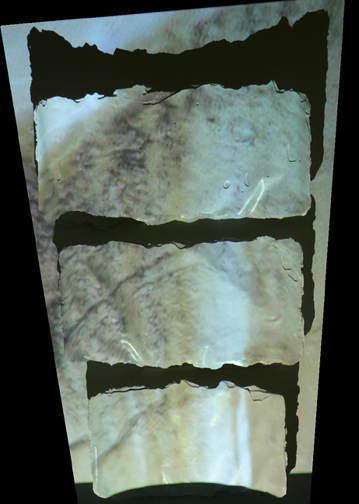My Country, Oh My Country 2007
(from Gusev Crater to the Meridiani Planum)
"Imaginary Places" Residency
Banff Centre for the Arts
Statement
The video installation documented here is a vision of earth from the perspective of space as my body travels over landscapes and surfaces at high speed. The color shifts speculate upon heterogeneity, and question whether sameness (a true monochrome) is ever possible. Difference is seen occurring, spilling, splitting, coexisting. The quick evaporation of the earth itself - stuttering up through the broken screens - might cause a seizure of the eye as the body remains fixed in space, helpless in the face of its own ephemerality.
Background
The nationalist ideology at the heart of US space exploration is also a kind of out-of-this world evangelicalism mirrored both in Christian science fiction and practice which considers our arrival in the Heavens to be "a manifest destiny": "We choose to explore space, because [it] lifts our national spirit... It is time for America to take the next steps... and extend the human presence across our solar system... We do not know where this journey will end, but we know this: human beings are headed into the cosmos." (The Renewed Spirit of Discovery, speech by President Bush, 2004)
For this project, as a point of comparison, I've looked at the work of late 19th-century Canadian psychiatrist Richard Bucke who wrote three book-length studies: Man's Moral Nature, Walt Whitman, and Cosmic Consciousness. Bucke was a utopian, socialist, and theorizer of man's consciousness expanding like the universe itself in an "ecstasy of curiosity and hope." Cosmic Consciousness, subtitled "A Study of the Evolution of the Human Mind," provides a poetic analysis of some of the world's most important spiritual figures: Gautama Buddha, Mohammed and Jesus as well as Whitman, Spinoza, Pascal and ordinary people. Bucke's "transcendental psychology" was a way of theorizing the growing social consciousness of humanity; the need to abolish nation-states and private property; the utter sanity of "divine revelation" and connectedness to earth, fellow man and the universe; and the birth of a new mindset that would propel humanity to neither war nor want.
One of Bucke's strongest convictions was that religion itself would not be necessary: "Churches, priests, prayers, all intermediaries between the individual and God will be permanently replaced by direct unmistakable intercourse."

